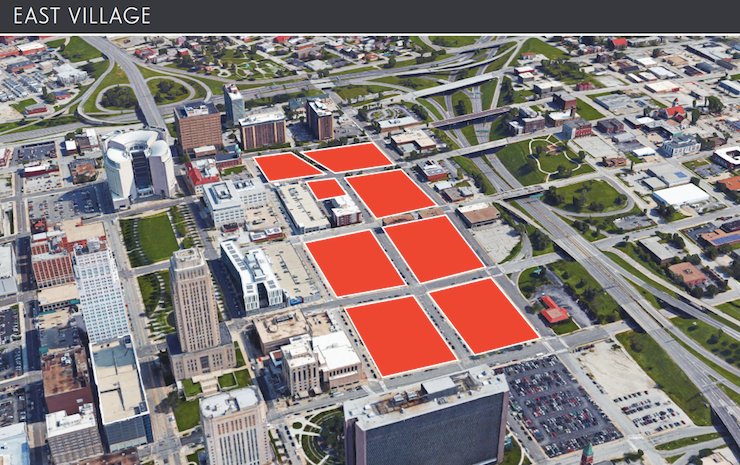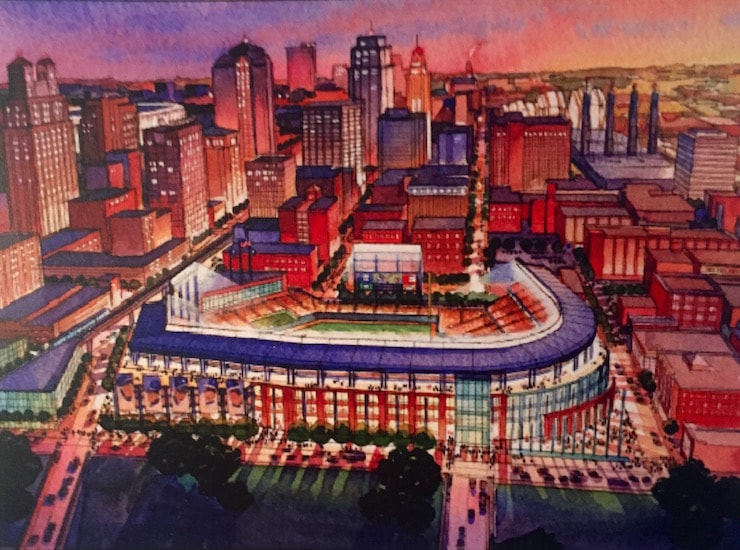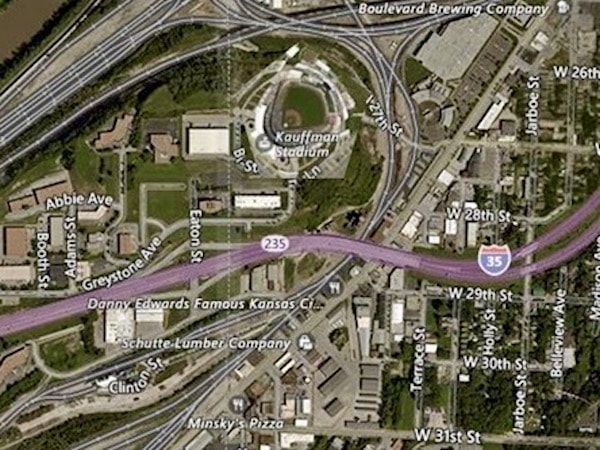New Royals Owner Talks About Downtown Baseball, East Village Several Downtown Sites Are Being Pitched
Published January 3rd, 2020 at 9:45 AM
Above image credit: Kansas City Royals owner John Sherman. (Contibuted | Jason Hanna)While cautioning it’s early in the game, John Sherman, the new owner of the Royals, has no problem talking up the economic benefits of downtown baseball and says he’s already being lobbied on possible sites.
“Baseball creates more economic opportunity in denser areas versus suburban areas or less dense areas,” Sherman said in a recent interview with CityScene KC.
“If you can put together the right package, downtown would be an interesting opportunity.”
While the team has not formally begun a review process, Sherman said there are several groups “putting ideas together.”
At this point, the proposed East Village location shows the most promise.
It’s an eight-block redevelopment area northeast of City Hall with enough space for a ballpark and already is controlled by one entity that would welcome the Royals, VanTrust Real Estate.
“We’ve been hearing from real estate people and others,” Sherman said. “The East Village is certainly a spot that could be of interest.
“I think there’s a top architectural firm or two who think this is a good spot.”

The East Village redevelopment site also is next door to the headquarters of J.E. Dunn Construction. The Dunn Family and J.E. Dunn are minority stakeholders in the Royals new ownership group.
Sherman also was familiar with two other possible locations, one that’s been in the potential downtown ballpark mix before, the North Loop, and another that has not come up in previous speculation, a location off Southwest Boulevard.
The North Loop site on the north side of the central business district is currently mostly controlled by Tower Properties and consists of several blocks now used for surface parking. It’s across the North Loop freeway from the River Market.
Sherman couldn’t offer details about the Southwest Boulevard idea, however a real estate source says enough land is available on a hilltop site near Cambridge Circle, not far from the Boulevard Brewery.
While it offers the potential for a ballpark aligned with a downtown skyline view beyond the outfield, it is not within easy walking distance, and the hilly topography is cutoff from downtown by the freeway and railroad tracks.
Sherman said at this point he was listening to ideas, and threw some praise to the team’s current location as well.
“You start with the fact we have a great ballpark on I-70 and 435, a beautiful place to play and we have a good relationship with Jackson County,” he said. “It’s a good lease with 11 years to go.”

That being said, Sherman acknowledged it will take significant lead time to assemble land and design a downtown ballpark should that be the route chosen.
“We have to be seriously looking at that within the next few years,” he said. “There’s a lot of work to do.”
That work would include determining how a new ballpark would be financed, traffic studies and other planning work. As opposed to his predecessor however, parking was not an overriding issue.
“It’s just one factor,” Sherman said. It’s part of what would need to be done to make sure it would work.
“Not everybody likes the idea of a downtown stadium, but a lot of people do for economic development. Parking is just one of the things.”
As for how a new downtown ballpark, which could cost an estimated $800 million or more, be financed, Sherman said he’s open to ideas.
“I wouldn’t want to comment on a lot of that,” he said. “It would take a public-private partnership and have to work for everybody.”
One benefit of the East Village location is it’s located within a federal opportunity zone, a designation that allows private investors in a ballpark project to obtain federal tax credits. The Southwest Boulevard location also is within a federal opportunity zone.
And while much discussion has been on the cost of building a downtown ballpark, whether staying put at Kauffman Field facility would be a substantially less expensive option is unknown.

The existing ballpark, which opened in 1973, will be almost 60 years old at the expiration of the current lease, and it cost $250 million to renovate it 11 years ago.
Sherman said it would be “hard to predict” whether the team would want to renovate the building again.
“It’ll depend on what we’ve done between now and then to keep current,” he said.
In addition to the potential economic development spinoffs of a downtown ballpark, the team could do better financially as well.
Sherman said he agreed with the conclusions of a report done by the Downtown Council in 2005 that indicated weekday attendance would benefit and a downtown ballpark would likely attract more corporate buy-in.
“There are more opportunities for those types of things (corporate suites),” he said. “Downtown baseball also can drive attendance.”
And the new Royals owner believes downtown has become a more attractive place since his predecessor, David Glass, was pitched on the idea of baseball there before rejecting it 15 years ago.
“I do like what’s going on downtown,” he said. “I think trends are great with Sprint Center, Power & Light District and the residential development.
“Kansas City is attracting young people down there and there’s new employment.”
Flatland contributor Kevin Collison is founder and publisher of CityScene KC, an online source for downtown news and issues.


